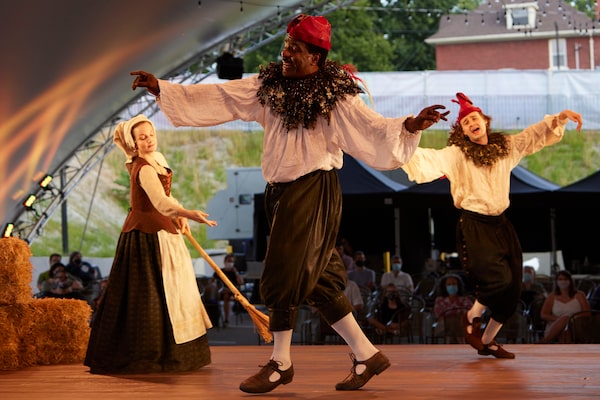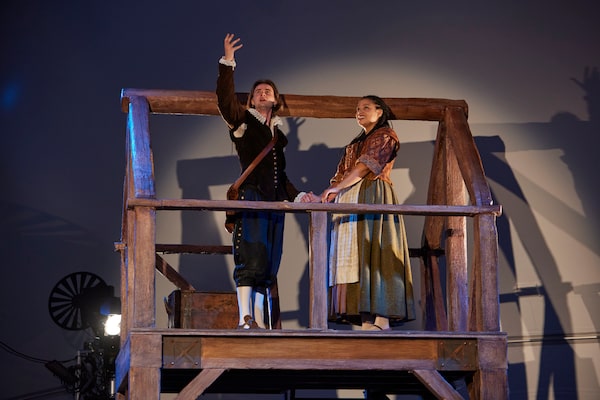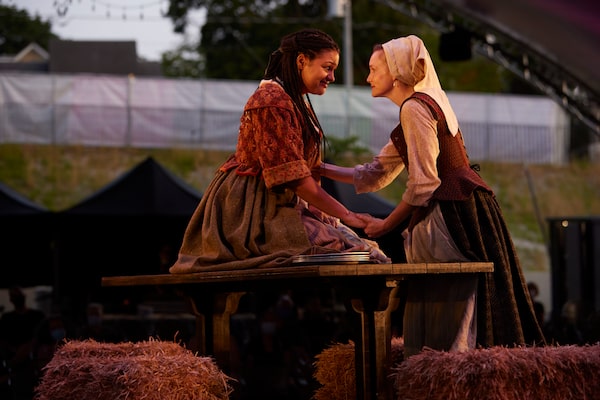
I Am William’s plot may be familiar preteen fare, but the style in which Rébecca Déraspe tells it is fresh and delightful.Courtesy of the Stratford Festival
Keep up to date with the weekly Nestruck on Theatre newsletter. Sign up today.
- Title: I Am William
- Written by: Rébecca Déraspe
- Translation by: Leanna Brodie
- Music by: Chloé Lacasse and Benoit Landry
- Actors: Shakura Dickson, Landon Doak, Allan Louis, Shannon Taylor
- Company: Stratford Festival
- Venue: Tom Patterson Theatre Canopy
- City: Stratford, Ont.
- Year: Runs to September 12, 2021
Critic’s Pick
Who really wrote the plays of William Shakespeare?
Well, it was his twin sister Margaret who held the pen, if you believe Rébecca Déraspe’s I Am William, a play with music aimed at young audiences that’s currently being presented at the Stratford Festival.
You’re not, mind you, supposed to believe Déraspe’s play. Indeed, the actors Allan Louis and Shannon Taylor tell us right off the bat in a prologue that we should suspend our belief, rather than disbelief: “Our depiction is fiction.”
(If only all the other silly folks who conjure up alternative candidates to Shakespeare as they obsess over the so-called “authorship question” had such self-awareness. But I digress).
Margaret Shakespeare (Shakura Dickson) is the entirely made-up teen heroine of this show originally developed through Quebec’s Théâtre Le Clou. While her brother William (Landon Doak) gets to go to the nearby grammar school, she has to hide under a classroom window to soak in what lessons she can between endless domestic chores.
Despite the attempts of Ma and Pa Shakespeare (Taylor and Louis) to keep her in her proper place, however, Margaret is a budding poet who writes secretly at night.

Landon Doak, left, as William and Shakura Dickson as Margaret.Courtesy of the Stratford Festival
Even when a local girl is drowned on suspicion of sorcery after boasting she has read all of Homer, she is undeterred from literary pursuits. Instead, Margaret turns that cautionary tale into the subject of her first full-length stage drama, incorporating elements inspired by her father’s declining fortune and her brother’s heartbreak.
I Am William’s plot may be familiar preteen fare – a fantasy of a plucky heroine standing up to the patriarchy in a hazy version of the past – but the style in which Déraspe tells it is fresh and delightful. The rising Quebec playwright’s dialogue is a parade of puns (translated to English well by Leanna Brodie, and no doubt it was a challenge) and made up of swift scenes that regularly puncture their own reality.
I Am William is also regularly punctuated by short songs, sometimes over almost as soon as they begin. The music is by Chloé Lacasse and Benoit Landry – and played by a truly exceptional trio led by Njo Kong Kie, who also came up with the artful arrangements.
Director Esther Jun’s production is pretty much pitch-perfect and her four performers seem to have great fun time acting in this Elizabethan travesty. And yet this is hardly the first play with a feminist message I’ve seen that, in form, ends up giving the best material to the male actors.

Dixon, left, and Shannon Taylor as Mary.Courtesy of the Stratford Festival
Louis gets to balloon, then pop or fizzle, as the domineering patriarch, while Doak delivers a Shakespeare who is a wonderful send-up of those sensitive guys with guitars who women are probably avoiding on docks across the country right now.
The two men also get to channel Monty Python on a horse ride – and play roosters who signal the beginning of each new day in the story with a cock-a-doodle-doo song that is ridiculous and a riot.
Margaret, by contrast, is a much more earnest part – though Dickson does a fine job of making her endearing.
I Am William is theatre for young people that’s not afraid of delivering a message directly. “Do some women deserve to be immortal, pass through fame’s portal, elevated with those genius men we’ve consecrated?” the actors say in an epilogue. “Evidence and common sense say yes; your textbook says no.”
I’m 40, not 14, but I’m not entirely certain this is accurate about the textbooks these days. I’m also not sure the statue topplers on the march, some of whom certainly have Shakespeare in their sights, are looking to set up new ones either.
I think I digress again.
In the interest of consistency across all critics’ reviews, The Globe has eliminated its star-rating system in film and theatre to align with coverage of music, books, visual arts and dance. Instead, works of excellence will be noted with a critic’s pick designation across all coverage.